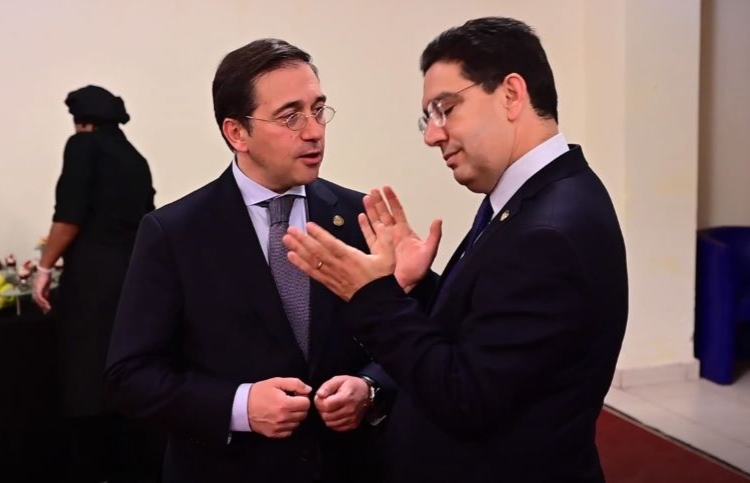Eduardo González
The Minister of Foreign Affairs, José Manuel Albares, yesterday held his second bilateral meeting in just two days with his Moroccan counterpart, Nasser Bourita, with whom he agreed on the “political decision” to reopen the borders with Ceuta and Melilla “in the very next few days” after remaining closed for more than two years because of the pandemic and the diplomatic crisis.
“Today (yesterday) I had a second meeting with him to continue advancing on that roadmap that was set on April 7 in Rabat and I can announce that we have reached a final agreement for the reopening of the land borders with Ceuta and Melilla in the coming days,” the minister told the press at the end of the ministerial meeting of the International Coalition against Daesh, held since Tuesday in Marrakech. Taking advantage of this event, the minister also met on Tuesday with Bourita, with whom he had not had any bilateral meeting since he came to office in July 2021, in the midst of a bilateral diplomatic crisis.
Albares could not specify yesterday the exact date or other details about the reopening of the borders, which correspond to the Ministries of Interior of both countries, but he did assure that “the political decision has been taken, the agreement is already definitive and the opening will take place through those passes and those customs in the very next few days”. In any case, the Ministry of the Interior had already set, last April 30, the reopening of the borders for May 15, after postponing it for two weeks to “finalize” bilaterally with the Moroccan authorities the “details and exact mechanisms” that will govern the transit of people and goods.
“We want it to be in an orderly, gradual way, so that it is really for mutual benefit and so that atypical trade also disappears and that, in terms of goods, we are at the best international standards, with transparency and within the regulation,” added Albares. The opening of “passages and customs”, he specified, will apply to “people as well as goods”. Therefore, the measure should entail the reestablishment of customs controls in Melilla, paralyzed since October 2018, and the establishment of a new customs office in Ceuta, which currently does not exist and whose creation would imply, in Moncloa’s opinion, the implicit recognition of Spanish sovereignty over the two autonomous cities.
On the other hand, continued Albares, the two ministers agreed to “convene the Working Group on the delimitation of maritime spaces in June and in Spain”. “One of the decisions we have taken together is that we are going to alternate, and sometimes the working groups and visits will take place in Morocco and sometimes they will take place in Spain,” he explained.
Likewise, Albares and Bourita expressed during the meeting their “will to hold the High Level Meeting, which will give a qualitative leap to our relationship, before the end of the year”. This meeting, said the Minister, “will lead to a new Treaty of Friendship and Cooperation between Spain and Morocco, which will reflect this new spirit of absence of unilateral actions, mutual respect, mutual benefit and very specific actions on which the various working groups are working”.
This same “spirit” was used by the Minister of Foreign Affairs to avoid any allusion to Morocco’s alleged involvement in the Pegasus plot to spy on the institutional cell phones of the President of the Government, Pedro Sánchez; the Minister of Defense, Margarita Robles; the Minister of Agriculture (and former ambassador to Rabat), Luis Planas; and the former Minister of Foreign Affairs, Arancha González Laya. “International relations are based on facts, not on conjectures, not on hypotheses, and I am not going to enter into any conjecture or any hypothesis about any country in the world,” Albares declared in response to all the questions related to the subject. “The spirit of the new stage, moreover, and that is in the joint statement, is based on mutual respect without unilateral actions, those are indeed concrete things,” he added.







